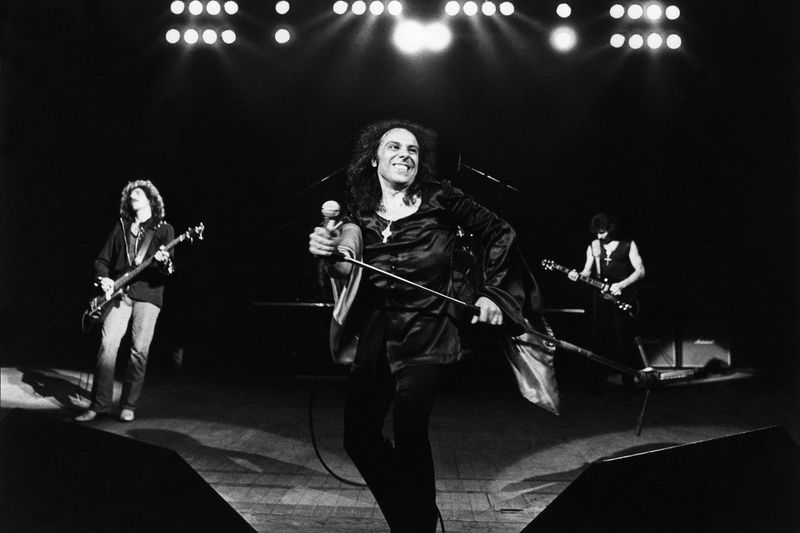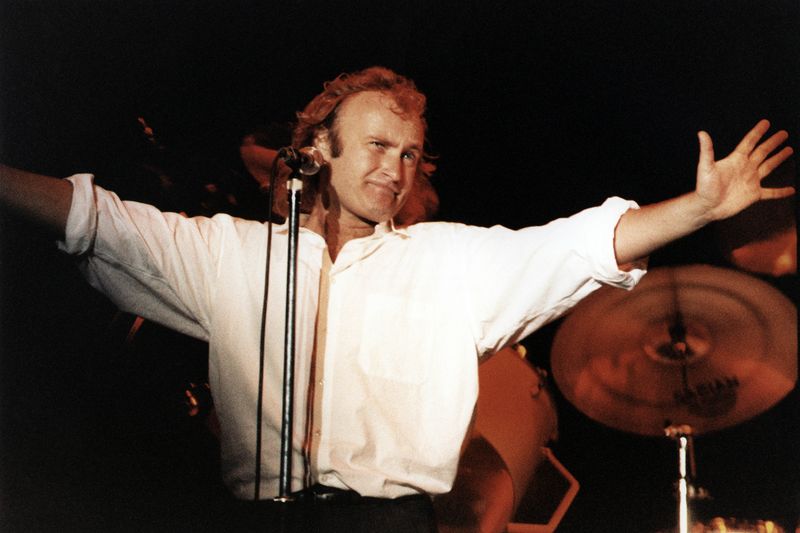Rock history is full of stories where the newcomer outshone their predecessor. This blog explores ten vocalists who stepped into iconic bands and took them to new heights. With charisma, vocal prowess, and sometimes a little bit of luck, these musicians proved that change can be for the better. Join us on this musical journey to celebrate these remarkable stories of success.
1. Sammy Hagar
Van Halen faced a daunting task in replacing David Lee Roth, but Sammy Hagar rose to the challenge. Bringing a fresh rock sound with his raspy tones, Hagar’s era was marked by commercial success. His first album with the band, “5150,” topped charts, signaling a successful transition.
Hagar’s energetic stage antics and infectious charisma won over fans, cementing his place in the band’s legacy. His collaboration with Eddie Van Halen brought new creative heights.
Sammy brought a renewed enthusiasm and a string of hits, proving that he was not just a replacement but a worthy successor.
2. Steve Perry
Journey’s sound was forever changed when Steve Perry joined the band in the late 1970s. His soaring tenor and emotive performances brought a new level of artistry. Perry’s voice became the defining feature of Journey’s most iconic hits.
Albums like “Escape” and “Frontiers” catapulted Journey to stardom, with Perry’s voice leading the charge. His heartfelt delivery and vocal range made songs like “Don’t Stop Believin'” timeless classics.
Steve’s influence on Journey is undeniable, elevating the band’s status and leaving an indelible mark on rock history.
3. Ronnie James Dio
Ronnie James Dio stepped into the legendary shoes of Ozzy Osbourne with Black Sabbath in 1979. His powerful voice and theatrical flair brought a new dimension to the band’s sound. Dio’s first album with Sabbath, “Heaven and Hell,” was a critical and commercial triumph.
Dio’s mystical and dark lyrical themes resonated with fans, offering a fresh yet familiar vibe. His commanding stage presence captivated audiences, revitalizing Black Sabbath’s appeal.
His era with Sabbath was marked by innovation and success, solidifying his place as a true icon in the metal world.
4. Brian Johnson
When Bon Scott tragically passed away in 1980, the future of AC/DC was uncertain. Enter Brian Johnson, a powerhouse vocalist with a gritty edge. His debut album with the band, “Back in Black,” became one of the best-selling albums of all time.
Johnson’s raw energy and distinctive voice perfectly complemented AC/DC’s hard-hitting rock sound, winning over fans worldwide. His dynamic stage presence and memorable voice quickly became synonymous with the band.
Brian’s tenure with AC/DC marked a new era of success, proving that even after a great loss, the show could indeed go on.
5. Phil Collins
When Peter Gabriel departed Genesis, Phil Collins stepped from behind the drum kit to lead the band. His transformation from drummer to frontman was nothing short of spectacular. Collins’ charismatic vocals and emotive delivery found a wide audience.
Under his leadership, Genesis transitioned into a pop-rock powerhouse, achieving widespread commercial success. Albums like “Invisible Touch” showcased Collins’ ability to blend complex rhythms with catchy melodies.
Phil’s unique dual role as drummer and singer became a hallmark of Genesis, leading them to new heights and a broader fan base.
6. Ian Gillan
Ian Gillan’s arrival marked a pivotal moment for Deep Purple. Joining the band in 1969, his powerful and versatile voice redefined their sound. Gillan’s dynamic range and stage presence made classics like “Smoke on the Water” unforgettable.
Deep Purple’s “Machine Head” album, featuring Gillan, became one of rock’s seminal works. His theatrical vocal style and emotive performances resonated with audiences worldwide.
Ian’s influence on Deep Purple brought a fresh intensity, pushing the band to global success and helping them become rock legends.
7. Axl Rose
Though not a replacement within Guns N’ Roses, Axl Rose famously filled in for Brian Johnson during AC/DC’s 2016 tour. His unexpected role was met with skepticism, but Axl’s performance silenced critics.
With his unique vocal style, Axl brought a different edge to AC/DC’s classic hits. His dedication to maintaining the band’s legacy was commendable and well-received by fans.
Axl’s stint with AC/DC showcased his versatility and commitment, proving he could step into one of rock’s most demanding roles successfully.
8. David Coverdale
David Coverdale’s journey from Deep Purple to forming Whitesnake showcased his evolution as a rock icon. His rich, bluesy voice became synonymous with Whitesnake’s success in the 1980s.
Coverdale’s stage charisma and vocal prowess drove hits like “Here I Go Again” to the top of the charts. His ability to connect emotionally with audiences set him apart.
David’s leadership and vision for Whitesnake transformed them into a household name, marking a triumphant chapter in his career.
9. Bonnie Tyler
Although not a direct replacement, Bonnie Tyler’s rise in the rock scene was meteoric, thanks to her collaboration with Jim Steinman. Her raspy voice became iconic with hits like “Total Eclipse of the Heart.”
Tyler’s passionate performances and unique sound distinguished her from her peers, making her a standout artist. Her songs’ theatrical flair resonated widely.
Bonnie’s impact on rock music highlighted her as more than a singer; she became a symbol of raw emotion and power, captivating audiences globally.
10. Eric Martin
Eric Martin’s introduction to Mr. Big was a turning point that brought the band commercial acclaim. His soulful voice and engaging stage presence became defining elements of their sound.
With hits like “To Be with You,” Martin’s vocal abilities were front and center, appealing to a broad audience. His versatility allowed Mr. Big to explore various musical styles.
Eric’s influence was instrumental in Mr. Big’s success, ensuring they remained a beloved band in the rock genre, with enduring appeal.










